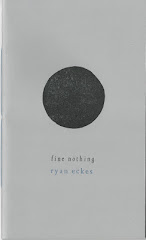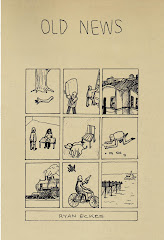
I’d go to Spain just for that. The whole image (from this website) gives me all that’s great in the world at the moment, in a moment. “In the world.” Funny it’s hard to feel “in the world” sometimes. Can you get chased out?
“The history of our time calls to mind those Walt Disney characters who rush madly over the edge of a cliff without seeing it: the power of their imagination keeps them suspended in mid-air, but as soon as they look down and see where they are, they fall.
“Contemporary thought . . . can no longer rest on its own delusions. What used to hold it up, today brings it down. It rushes full tilt in front of the reality that will crush it: the reality that is lived every day.”
That’s from The Revolution of Everyday Life by Raoul Vaneigem, written about 50 years ago, in French. On some scales, not long ago. Situationist.
Last April the poet Kit Robinson came to Philly, and I got to read with him at Fergie’s. We both happened to read poems titled “The Station.” His, from a book called The Crave, goes like this:
As you were
stuck in one place
the 70s
You thought to write
perchance to cut
a stencil
Against the time
a steady state
rhyming
With a groove
“Call Me”
the sounds of cars at night
Insubstantial
against the space
of an empty lot
Shot full of holes
the smoke
sign of the placeholder
You were just waiting
outside a factory
in-plant maintenance
Surrenders its secrets
on the off chance
guards the rails
Too many untouched to remember
Reading the poem, I can’t help but think of New Jersey. It’s the 5th stanza mostly: “Insubstantial/against the space/of an empty lot”. NJ: that steady, stationary state of dull, cloned highways and parking lots that are empty even when full. The emptiness of a reality that is lived every day in many states. Jobs, jobs, jobs. The poem runs on a concern with creating the steady state of, say, a song that would resist that reality. That last lone line gets me—untouched rails, untouched people. Train after train, call not going thru, trace of the broken down. I return to the ambiguity of “in-plant maintenance” a few lines prior, of what all’s in that—its possible subjectivity.
Here, let’s consider the following quotations as a pair of rails:
“Poetry is language on a holiday. Free to go where it will. But it is not jobless. The job of poetry is to continue, despite everything that is pitted against it.” – Kit Robinson, from poetics statement on Elective Affinities
“The Occupy movement is a holiday. There is nothing frivolous about that. Holidays are not escapes; at their best, they deepen our experiences of things. Consider the rituals of this holiday . . .” – Jeff Sharlet, from “By the Mob’s Early Light: The Ritual Significance of Occupy Wall Street” (Bookforum, Jan/Dec 2012)
Some holiday in Chicago:
Some holiday in Philadelphia:
Mic Check at Philadelphia City Council
Lately holidays like these in cities the world over—disruptions that got us thinking about the possibility of an actual public and the imagination and collaboration that would require of so many people. In the examples above, the ritual of the people’s mic (aka ‘the human mic’) stands out—an aggressive, sometimes affective tactic which, in other contexts, such as a general assembly, can create profound empathy and cooperation that fosters a culture of listening. On one hand it can be used to shut down dialogue (a good thing only when what’s being shut down is the false, ceaseless political discourse controlled by the rich); and on the other hand it can intensify communication within a group.
As Sharlet points out, at GAs “you find yourself repeating things you don’t agree with. And you watch the inevitable cranks and complainers who are forced to repeat the crowd’s pleas for them to let the meeting proceed. You become intimately aware of language, parceled out in short phrases; you reconsider which of your own words are really necessary.” The slowness and tedium of the people’s mic are elements of its strength, if only because it can help us see just how conditioned we are by convenience culture, by capitalism.
The poet Janaka Stucky took a screen shot of that image and it spread quickly over the internet via facebook. Another wonderful disruption, it struck me as so utterly perfect when I first saw it, an experience similar to first seeing the image of the giant bird on wall in Spain (above). But I also thought immediately of friends and enemies who’ve scoffed at or dismissed the occupy movement, and I laughed.
A friend re-posted the image on facebook right after me and right away someone responded defensively, idiotically, along the lines of: Are you suggesting there is some great corporate CONSPIRACY against us? This doesn’t PROVE anything . . .
You are the conspiracy, fucko, and the proof.
I didn’t say that. Actually, I didn’t reply at all because, at the time, a Tom Waits song was playing in the juke box in my head, sadly merrily, and I was enjoying it all too much, the ironies, the associations.
TIME TIME TIME TIME
“The fight for Eros is the political fight,” I’ve kept reminding myself since hearing Angela Davis speak in October. I wish there were a recording of her entire talk that night at Irvine Auditorium at Penn (a beautiful auditorium, by the way—it was my first time) so that I could revisit the whole inspiring thing. Anyway, she closed by quoting Herbert Marcuse, her former teacher: “The fight for Eros is the political fight.” And later she marched down to Occupy Philly and spoke again, for a much shorter time, and quoted, again, the poet Audre Lorde, as she has many times in many places—to sustain the holiday:
"Differences must not be merely tolerated but seen as a fund of polarities between which our creativity can spark like a dialectic" (from Lorde’s essay “The Master’s Tools Will Never Dismantle the Master’s House”).
The full gist:
Let’s say this movement, in the U.S. at least, is about education (or learning—that might be a better word), and that all concerns are tied to it. This would include ways to talk and hear (ways of being), but also seeing how systems—especially education systems—teach us to chase ourselves out of the world. And so the movement would need to continually disrupt those systems, in new ways, with an eye always toward replacing (not just “reforming”) them. Invention is absolutely necessary here (consider Slavoj Žižek’s words at OWS, for example, and here).
Ted Greenwald’s memoir, CLEARVIEW/LIE, has me reflecting on what a city public education does to you, how it shapes your mind. School was where I learned to not learn, to not create, to shut down, be afraid, give up, hate people. Greenwald doesn’t rip into it, but he shows, in playful ways, the subtle and profound impact a public education can have (for him, it was Queens in the 50s) as his story bounces back and forth in time. Note how he squeezes in Paris 68, which reappears throughout the book:
Since the beginning of time there are Four Seasons. Our four is The School Year.
School, school yard hang out with friends, listen to radio stories, dinner, homework, bed. It’s a week night and school’s tomorrow. Halloween, Christmas, pea shooters, yoyos. Then, it’s summer.
The Filipino yoyo experts at Lamston’s did great yoyo tricks. But my favorite thing, they carve small native village scenes in the sides of the deluxe models, with rhinestones imbedded.
The diurnal course, more, courses accompany me to college, where in my second year, taking a leave of absence, go to the Meadows on a Tuesday night. Dumbfounded. What are all these people doing here, it’s a school night.
The ghostly patterns burn into my screen.
In 1968 in Paris, at the beginning of May feel a vaguish undefinable uneasiness. Finally, figure out, paper and final time. The School Year afterburn.
Summers are great, too short. Plant stuff, play war, build tree forts, drink many-colored sodas, smoke, fish, swim. Too short.
And later in the book:
Like it or not, maybe it’s all those war movies, the war seeps into my mind . . .
At any rate, lookit
In public school, it’s very great to be in the cockpit of the American Dream. Right there the mist-enveloped pop culture crossroads crucible, in there with a devil.
Sign on the dotted line
Anyway
The dewy self is revealed, not some decorated or value-added form, call it entertainment, once complete, personality and all, drains and makes void, something repeatable and infinitely reproducible.
Think about it, with a calendar advent of entertainment, if one definition of insanity is doing the same thing expecting a different outcome, entertainment is insanity’s perfect vehicle.
Get your ass in said ve-hicle.
The faint and built up fear, the same thing wants to be fresh never, is. Even if its song is an infinity cover.
Writ from inside out.
Being always outta here, stronger and stronger. School and its directions, to my lights, start to complement what attracts my attention outside of school.
The talking to myself, underbreath cursing, is a lifelong soundtrack accompanies myself working doing something requires you gotta concentrate. Driving, after I get my license in high school, talk to the road, other cars, other drivers, the radio.
If watching TV (now and then) talk to shows, the plot, the characters the dialogue.
Same in movies, I’m not the only one with the running commentary.
Working, similar, to keep going often let my eye run over some page of something I’m reading, stop where it will use the words (however) to move on with.
Greenwald's creative adaptability is fascinating and remarkable to me—the method he found to respond to (talk from, create out of) the insanity of the “infinitely reproducible,” the monotony of pop culture/school. The tic, or habit (ritual?) in the interest of sanity leads to new forms. (It’s interesting how this sheds light on his poetry, which maybe I’ll write about elsewhere.) What I identify with here is the restlessness, from which the book’s refrain of “anyway” was likely born.
I use “anyway” constantly in conversation—as a way to move on, to keep going or to get to a point; also to level off something I just said, to reduce or dismiss its significance; or to abandon a point altogether. For me, “anyway” is often a sigh, a sign of resignation: only so much can be communicated, I give up, not worth it. You can hear it when I talk. Now where’d I learn that? Those dim hallways of those dim, dull buildings I spent all those years in?
What of my words come out that hallway of my throat?
Anyway, I’ll finish up here with a pair of animated histories to think about.



